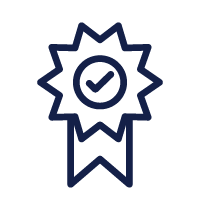
The busy season for accountants, auditors and tax professionals is coming up fast, and you may already be dreading the stress and exhaustion that comes with it. While we can't reduce your workload, we don't want you to burn out. To help you make it to the finish line (ie: April 15th), we're sharing five tips to help you survive busy season.
Summary
Learn five survival tips to help accountants, auditors, and tax professionals cope with the stressful busy season, which generally runs from January through April 15th: inform family and friends, maintain a healthy lifestyle, take regular breaks, stay motivated, and plan a celebration for the end of the chaos.
Before you dive in, check out this clip from our CPE podcast, Tax News Now. Host Mark Gallegos is joined by Brandon Lagarde, a partner at Tax Services Group at EisnerAmper, to discuss what to do when you're feeling burnt out.
Listen to the rest of the discussion in Tax News Now: Tax Topics with Brandon Lagarde on Apple, Spotify, or in your CPE LMS!
What is busy season for accountants?
The "busy season" in accounting, tax, and auditing is a high-pressure period of immense workload and stress for professionals in the industry. This crucial annual period is often compared to a marathon ending at the April 15th tax deadline.
What makes busy season difficult for accountants?
During busy season, accounting professionals manage a heavy influx of work and they often need to put in long hours and strategize efficient processes to meet their deadlines.
Several key overlapping financial requirements and deadlines trigger "busy season." These include:
1. Tax Deadlines: Accountants prepare, review, and file tax returns for both individuals and businesses, ensuring all filings are correct and submitted before the cutoff dates to avoid penalties. Personal tax submissions must be submitted by April 15th, serving as a crucial marker to end busy season.
2. Year-End Financial Reporting and Closings: Companies finalize their financial statements at the end of each calendar year, reconciling accounts and correctly recording transactions. Accountants prepare necessary documents like balance sheets, income statements, and cash flow statements to give the company an accurate picture of the its financial health.
3. Quarterly Reporting: Especially for large and publicly traded companies, quarterly reports require that accountants gather, analyze, and present data within a short period of time, adding even more seasonal pressure.
4. Audits and Compliance Reviews: For auditors, the busiest time typically runs between January and March. Auditors are responsible for reviewing financial statements for accuracy and regulatory compliance. This process is demanding due to tight statutory deadlines, the need to coordinate with multiple stakeholders, and the high complexity of the workload.
When is busy season for accountants?
If you're just starting your accounting or auditing career, you may not have experienced the busy season, but it starts in January and runs through April. Auditors are busiest between January and March, and the tax deadline for both individuals and the majority of businesses is April 15th, ensuring tax professionals have to hit the ground running at the start of the year and only get busier over the following months.
How do I get through busy season? 5 tips for survival
Once the holidays are over, the busy season for accountants start, and it's a marathon, not a sprint. To make sure you have the mental and physical energy to make it to the finish line, implement these survival tips and strategies.
#1: Inform your family and friends
Your family and friends may not realize or understand why you're so busy, especially if you end up missing social gatherings, family meals, and other events in order to meet deadlines and finish the workload. Let people in your circle know what's going on and that you may not be as available as you usually are. Setting the expectations before you go missing will prevent confusion and hurt feelings.
#2: Keep a healthy lifestyle
Despite the early mornings and late evenings, be sure to take care of your physical and mental health. Many accountants risk burnout that can lead to illness, fatigue, and sleep disorders, which you definitely don't need anytime, much less between January and April.
- Drink plenty of water (when you're not drinking coffee)
- Go to the gym or do other things to stay active
- Don't skip meals
- Eat healthy snacks
- Aim for seven hours of sleep each night
Following the basics will keep your energy up and support your immune system, keeping you healthy and focused during the hectic workdays.
#3: Take regular breaks when you can
Whenever you get the chance, take a break and go for a walk as a refresher. Just getting away from your desk and getting some fresh air can give you a much-needed reset. Claire N., an accountant from our Facebook community, goes outside to get the mail as a break. Sarah T. says, “or gladly do the snacks run!”
#4: Stay motivated
When you're in the thick of the busy season, it may seem impossible to stay motivated. However, keeping a positive outlook can make or break your time at work and can even affect your coworkers' morale. Know that you'll make it to the finish line and keep your head up along the way. Sarah T. offers her own busy season suggestion, “Work 11-13 hours, sleep 8 hours, the remaining 3-5 hours must include a 30-minute walk and of course showering and eating. Attitude: this misery will end in a couple of months!”
#5: Celebrate the end of the busy season
Make plans to celebrate the end of the chaos! Book a massage or a spa day, plan a weekend getaway, or even schedule a much-needed vacation. Having something to look forward to will help you stay motivated and help you recharge when it's back to the still-busy work for the rest of the year.
Just remember that you’re not in this alone. There are plenty of others who understand exactly how demanding this season can be – stick together, you can do this!
Accounting resources to help during busy season
Make sure you're ready for the upcoming busy season for accountants with all the latest news and updates! Check out our tax resource guide or go deeper with our CPE courses related to tax insights and education.









